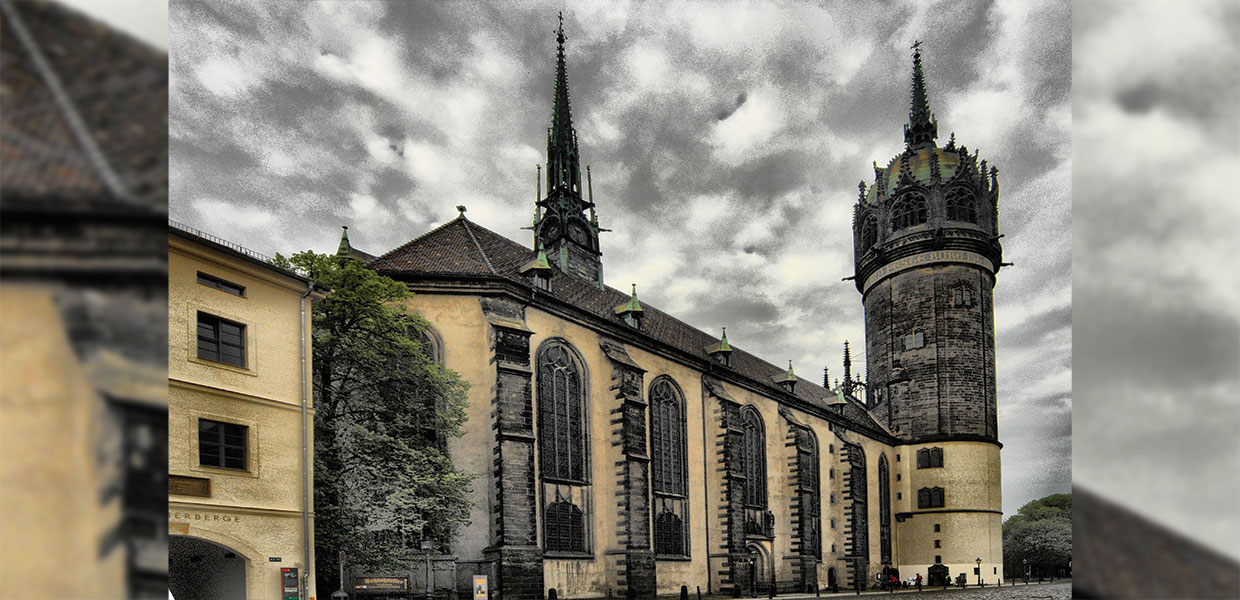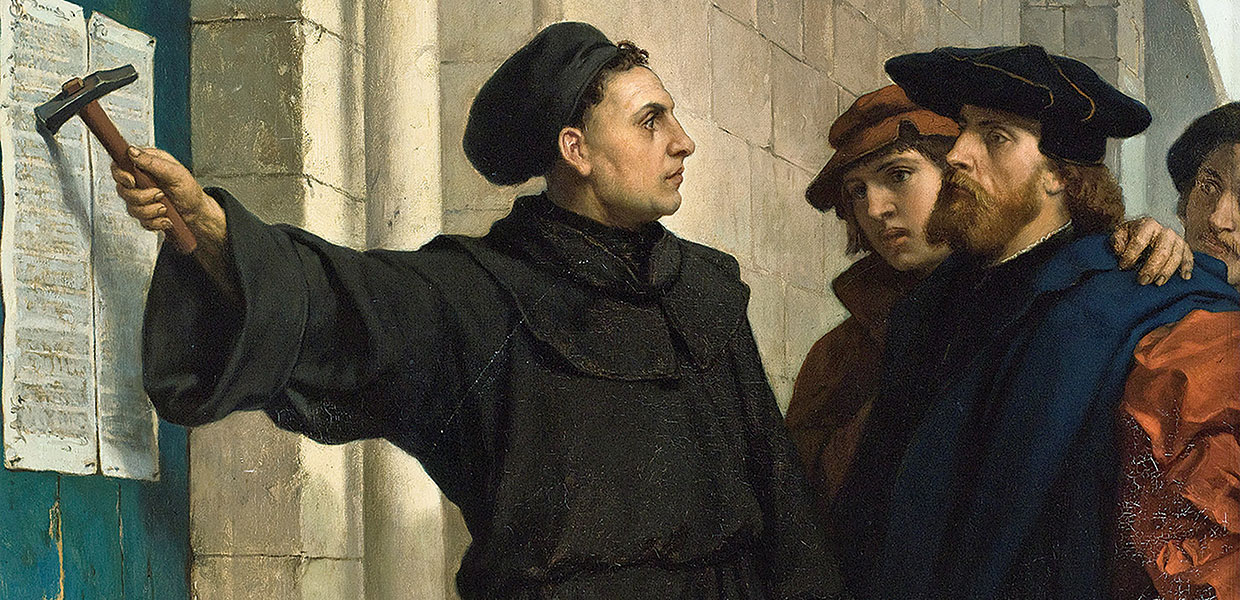
PD_US

PD_US
October 31, 1517, was a day Martin Luther would never forget. The 34-year-old monk posted the Ninety-five Theses in Wittenberg, Germany. Five hundred years later, most still know about the event, though many are not quite sure what happened that day. In that historic document, among other things, Luther challenged the sale of indulgences — something that was important to the Roman Catholic Church. The church needed money for the building of St. Peter’s in Rome, and the sale of indulgences was an effective way of getting the funds. It was easy money. As Luther biographer Roland Bainton wrote, indulgences “were the bingo of the sixteenth century.”
On the same day, Luther also wrote a letter, including a copy of the Ninety-five Theses, to Archbishop Albrecht, the most important religious leader in the German lands and one who received a portion of the indulgence income. Even though Luther addressed the archbishop as “Most Illustrious Lord,” and referred to him as “my lord and shepherd in Christ,” the letter was an outright challenge to the archbishop. The formal politeness of Luther’s letter did not soften this stinging statement: “What a horror, what a danger for a bishop to permit the loud noise of indulgences among his people, while the gospel is silenced, and to be more concerned with the sale of indulgences than with the gospel!”
The posting of the Ninety-five Theses and the letter to the archbishop soon made Luther an outlaw. The pope, the head of Luther’s own church, was after him, as was the newly elected emperor, 19-year-old Charles V. In 1521, Luther was excommunicated from the Catholic Church and appeared before the Imperial Diet at Worms, Germany, where he proclaimed, “Here I stand, I can do no other, so help me God.” God used Frederick the Wise, the elector of Saxony, to save Luther’s life by hiding him in the Wartburg castle.
Luther is a complex figure. On the one hand, he was a man who often spoke and acted harshly against his enemies or those who did not agree with him. On the other hand, he started a Reformation that still impacts us today. His actions and writings changed the world for better. What are some of the things that he did, and how do they impact us today? Here are two examples.
Giving Us a Readable Bible
Of course, the Bible existed before Luther, but most were not able to read it, and the church did not encourage the reading of the Bible. The Latin Vulgate Bible was an old translation and only a few understood it. Even most priests, who often had little education, could not read the Latin Bible. There were a number of German Bibles available, but they were rather “wooden” as the translators tended to translate word for word, and such an approach does not make a smooth translation.
While Luther was hiding in the Wartburg castle, he suffered poor health and isolation. But, during his stay he accomplished one of his greatest achievements — translating, in about 90 days, the New Testament from the Greek (not Latin) into German, which could be understood by the people. Luther was a gifted writer and his translation was the prime evidence of that gift. The New Testament was published in September 1522; by Christmas of that year, the first printing was sold out. The entire Bible was translated by 1534, and in that period about 200,000 copies were sold — a best seller. Those numbers are equivalent to 6.5 million copies sold today in the United States. The Bible was preached, and people read it in their homes.
Luther’s translation inspired others to put the Bible into their own language. William Tyndale, for example, proposed a translation into English, but the religious leaders opposed such a project and he fled from England. He moved to Germany and provided an outstanding English translation that was smuggled into England. His own countrymen betrayed him, and Tyndale was executed in Belgium for the crime of translating the Bible. His work, though, lived on in the later King James Bible (KJV), for scholars estimate that about 80 percent of the KJV is based on the Tyndale translation.
What about now, 500 years after the Reformation started? Is the Bible important in our personal life? What about our preaching and worship? In some worship services only short Biblical passages are read. If we are heirs to the Reformation, the Bible must be central in our worship.
Teaching Us to Pray
Prayer was a part of Luther’s monastic life, but he developed a new perspective on prayer once he realized that God was a loving God. Prayer became a powerful force in the Reformation. Ellen G. White writes, “From the secret place of prayer came the power that shook the world in the Great Reformation.”
One of Luther’s most significant writings on prayer was a pamphlet he addressed to his barber, Peter Beskendorf. The message was clear — Luther was taking prayer out of the monasteries and cloisters and planting it in people’s everyday lives.
Luther’s prayer life was disciplined, and he focused it around the Ten Commandments. He tells his barber that through the commandments “a heart should be able to get in touch with itself and warm up for prayer.” The commandment that tells us to have no other gods, according to Luther, teaches us to trust God in all things. “I should cling to God,” writes Luther. And, the Sabbath commandment, according to him, gives us time to “hear and reflect on the word of God,” and to praise Him.
Luther reminds us that prayer is central in the life of the individual and the church. It must also be a central part of worship and congregational life.
Experiencing the Reformation Today
What can be done to remember and, more importantly, experience the Reformation message today? Some of these activities can be done alone, while others lend themselves to group activities. Here are helpful suggestions for individuals, families, groups, or congregations:
- Read a biography about Martin Luther. Here I Stand: A Life of Martin Luther by Roland Bainton is a good start.
- Read the Reformation chapters, especially 7,8,10, and 11, in The Great Controversy by Ellen G. White. (She wrote more about Luther than about any other Reformer.)
- Pacific Press has released three books on the Reformation. Two of them, The Reformation and the Remnant and 500 Years of Protest and Liberty, are by Nicholas P. Miller. The third, Here We Stand: Luther, the Reformation, and Seventh-day Adventism, is written by an international group and edited by Michael W. Campbell and Nikolaus Satelmajer.
- Organize a group and watch the black and white version of the classic film called “Martin Luther.” Search on the web “Martin Luther DVD item 4623D.”
Former associate ministerial secretary and Ministry editor, General Conference of Seventh-day Adventists
Southern Union | October 2017



Comments are closed.